 I am Carol Patrice Christ, born in Pasadena, California, daughter of Janet Claire Bergman, born in El Paso, Texas in 1919, daughter of Lena Marie Searing, born in Lyons, Michigan in 1891, daughter of Dora Sophia Bahlke, born in Lyons, Michigan in 1858, daughter of Maria Sophia Catherina Hundt, born in Parum, Mecklenburg in 1827, daughter of Catherina Sophia Elisabeth Schoppenhauer, born in Pogress, Mecklenburg in 1798, daughter of Anna Sophia Seehasse, born in Zulow, Mecklenburg in 1756 in the clan of Tara. I come from a long line of women, known and unknown, stretching back to Africa.
I am Carol Patrice Christ, born in Pasadena, California, daughter of Janet Claire Bergman, born in El Paso, Texas in 1919, daughter of Lena Marie Searing, born in Lyons, Michigan in 1891, daughter of Dora Sophia Bahlke, born in Lyons, Michigan in 1858, daughter of Maria Sophia Catherina Hundt, born in Parum, Mecklenburg in 1827, daughter of Catherina Sophia Elisabeth Schoppenhauer, born in Pogress, Mecklenburg in 1798, daughter of Anna Sophia Seehasse, born in Zulow, Mecklenburg in 1756 in the clan of Tara. I come from a long line of women, known and unknown, stretching back to Africa.
In our ritual on the Goddess Pilgrimage to Crete this May, I will have two new names to add to my mother line. The name Sophia was passed down through the maternal line for at least four generations. I am sorry it was not handed down to my grandmother, my mother, and me.
When I left for Germany a little over a month ago, I knew that Dora Sophia Bahlke was the mother of my grandmother Lena Marie Searing and that Dora Sophia’s parents were Anton Bahlke and Maria Hundt, immigrants from the small towns of Parum and Dummerhutte, in Mecklenburg, Germany. I did not have their parents’ correct names, and I had very little information about their lives in Germany. I have now put some flesh on the bones.
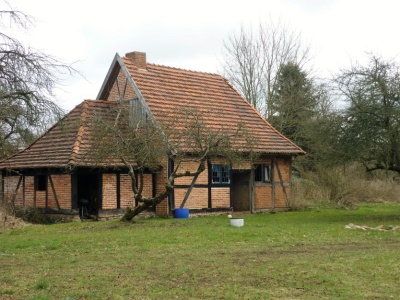
Anton Bahlke and Maria Hundt were confirmed in 1841 in the Evangelical Lutheran Church in Parum. When I visited the church, the organist was practicing on an organ she said dated from the early 1800s. The main part of the church must have looked much as it does today when our family members were baptized, confirmed, married, and buried in it in the 1700s and 1800s.
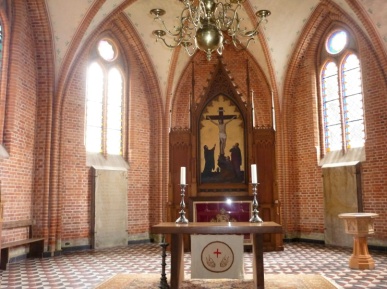
Life in Mecklenburg was difficult in those days. In 1820, the serf system was abolished. This was not done to “free the poor” from servitude. Quite the opposite: the serf system was abolished to “free the aristocracy” from its duty to care for the poor who worked their land. Many former serfs were reduced to the position of landless day laborers. As in other parts of Germany, laws were passed to prevent poor men from marrying. Due to this situation, one-third of the population of Mecklenburg, about 250, 000 people, decided to emigrate. Many found that emigrating was the only way they could marry and raise a family.
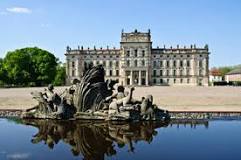
Anton’s father was a “cottager,” a disenfranchised serf who owned only the small piece of land surrounding his cottage; he also worked as a carpenter and a day laborer. Maria’s father was a cottager; he supplemented his income working as a “forester,” maintaining the forests and cutting trees for firewood. Maria’s paternal grandfather was also a cottager. Her maternal grandfather was a day laborer, who moved around to find work. All of these families were “dirt” poor, not owning enough land to support themselves. Anton Bahlke was a blacksmith, but this profession could not have provided him with a stable income, as it appears that he was not allowed to marry.
According to the biography of their son William, published in Gratoit, Michigan, the marriage of his parents took place shortly before their departure for the United States in July, 1854. However, there is no record of this marriage having occurred in Parum from 1850 to 1854. Anton Bahlke and Maria Hundt were listed separately on the alphabetical passenger list for their journey to America, an indication that they were not married when they left. They said they had a common surname on arrival, but a shipboard marriage is unlikely.
(Shockingly to me) they acknowledged a child, Caroline M (Line or Lena) Hundt (Bahlke), born in 1850 in Germany. Her death certificate lists them as her parents. This child did not travel with them to the United States in 1854. Instead, Line Hundt, age 16, of Dun [Dummerhutte], Mecklenburg departed for New York on May 5, 1866 from Hamburg. By the time of 1880 census she was married and living in in Pewamo, Ionia, Michigan, not far from her parents.
I suspect that Anton and Maria were restricted from marrying when Line was born and that they left her with Maria’s mother when they emigrated. Dora Sophia Bahlke must have felt close to the older sister who arrived when she was 8 years old, for she named my grandmother Lena Marie after her.
Here is what I imagine my great-great-grandmother might have had to say about all of this:
Though I went to school to learn to read the Bible, I was also working on our small plot of land from a young age.
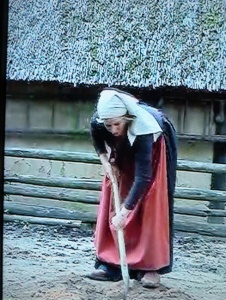
When I could escape my chores, I would set out with one of my brothers or sisters through the fields and forests to the Dummersee.

There I sometimes caught a glimpse of Anton fishing or playing with his friends. When we were older we used to meet secretly. We pledged to marry, but we knew we would have to wait until Anton had the means to start a family.

I had just turned 22 when I discovered I was pregnant. Anton could not get permission to marry me. I was afraid to tell my parents. They were not happy, but what could they do? They agreed to help me raise the baby. She was named Caroline Maria, but I called her Line. How I wished Anton and I could have made a home together with her.
Fearing that I would get pregnant again, my parents tried to keep me from seeing Anton. Finally, we decided that the only way to be together was to leave Mecklenburg. My mother insisted that she could not bear to lose both me and Line. Leaving my daughter with my mother was the hardest thing I ever had to do. With my mother on one side and Anton on the other, I had no choice.
When Anton and I settled on the farm in Lyons, I had Mary, and then Dora, Albert, and William. None of those children made up for Line. It was worse after Mary died. How I longed to see and hold my Line again. My mother would not let her go. When she turned 16 Line told my mother she was leaving. She was practically a woman herself, when she arrived in Lyons. It had been 12 years since I left her. How we clung to each other. How many tears we cried.
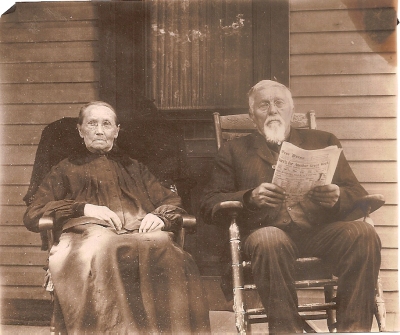
*
“But these stories are so sad,” one of my friends responded as I was telling her about what I had discovered in Germany. This of course is why the stories were not passed down to me. And yet, they are my stories. They help me to learn that nothing human is alien to me.
My grandmother was terribly embarrassed when my brother’s young wife gave birth less than nine months after their marriage. I wonder if she knew her grandmother’s story.
*Thanks to Christa Schoeniger for accompanying me in Mecklenburg.
Update: The records we found in the Evangelical Church archives in Schwerin have now been posted on Ancestry. I have learned that Anna Sophia Seehasse’s father came from the island of Poel and that her mother’s name was Marie Dorthie Josten. I have also discovered a record showing that the father of Line was Carl Friedrich Bahl an itinerant shoemaker from Stavenhaven who passed through Dummerhutte (no apparent relationship to Anton Balke.)
Carol P. Christ is author or editor of eight books in Women and Religion and is one of the Foremothers of the Women’s Spirituality Movement. She leads the Goddess Pilgrimage to Crete in Spring and Fall: Sign up now for spring tour and save $100. Follow Carol on Twitter @CarolP.Christ, Facebook Goddess Pilgrimage, and Facebook Carol P. Christ. Carol speaks in depth about the Goddess Pilgrimage to Crete in an illustrated interview with Kaalii Cargill. Photo of Carol by Michael Bakas.
 A Serpentine Path: Mysteries of the Goddess
A Serpentine Path: Mysteries of the Goddess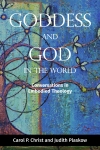 will be published by Far Press in 2016. A journey from despair to the joy of life.
will be published by Far Press in 2016. A journey from despair to the joy of life.
Goddess and God in the World: Conversations in Embodied Theology with Judith Plaskow will be published by Fortress Press in summer 2016. Exploring the connections of theology and autobiography and alternatives to the transcendent, omnipotent male God.


I really like your comment re freeing the aristocracy from caring for the poor. The same is happening under neoliberal economic policies, freeing the corporates from any responsibility at all and governments are following suit in demolishing welfare systems.
LikeLiked by 1 person
very moving Carol … it is good to learn the stories of our lineage: and yes, I agree they help us to learn that “nothing human is alien” to us. For our upcoming Samhain ceremony (in early May) we will be naming our matrilineal line only as far back as 3 generations, but hopefully some will be able to take it further, and at least imagine all the way back …
LikeLike
Thanks, Carol. Inspiring research!
LikeLike
Does the making, having, leaving, missing of babies consume the time and energy and emotion of man’s mind as it does woman’s?
LikeLike
I think the experience of carrying a baby for nine months creates a bond that men must create in other ways or have the option not to create. Yet Long Lost Family shows that there are men who long for their children as much as the women on the show do.
LikeLiked by 1 person
Thank you for sharing your journey. It’s funny…when you first began blogging on FAR about your ancestry several years ago, I didn’t connect emotionally with it at all. I had never really been interested in my family tree.
However, late last year, my husband and I bought a house near the town where I grew up (to be closer to my mother and younger brother who are both in ill health) — a state I swore I would never return to, and I haven’t lived here for 40-plus years (I’m 55). The move spurred me into uncovering my roots on a new level in order to try and understand why my perception of the world is the polar opposite to most of my family. This genealogical journey has helped tremendously because, as you mention in various of your posts, we learn about our family and about history through their lives; most of my family on both sides of my tree have been in Missouri since the mid-19th century, and about 85-90% (I’ve been able to trace, surprisingly, nearly everyone) have been in America since the early to mid-17th century, starting on the East Coast and gradually migrating across America as new lands kept opening up to settlers.
So, for nearly 400 years, most of my ancestors have been seeking freedom and independent lives; I’m no longer confused about my “seeker genes.”
I’m happy for you that you are also uncovering family history that seems to soothe and reward!
LikeLike
Thanks for Sharing
LikeLike
I love your retelling of your great-great-grandmother’s story. It is a sad one for sure. It does seem that the long, long saga of human history has many sad moments in this world which allows so much oppression and domination.
I think it’s a beautiful thing that so many of us are being drawn to discover our ancestral past and through this discovery learning about many difficult situations which our ancestors faced and survived. Here in the U.S. many of us have ancestors who left Europe because of poverty and oppression or were sent here as political prisoners or indentured servants.
It’s great you had this journey and discovered so many moving truths.
LikeLike
What a wonderful moment for you it must have been to meet again with your daughter. :-) Beautiful story.
LikeLiked by 1 person
Not me, my 2x great grandmother and her daughter.
LikeLike
Sorry. In the moment of reading it I was one with them.
LikeLike
Thank you so much for posting this. I recently found out that both my great-grandparents were illegitimate and other ancestors further back – this truly put it into perspective for me.
LikeLike
Not many Germans know that poor men were prevented from marrying in many of the German states.
LikeLike